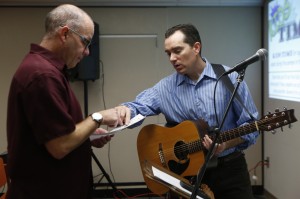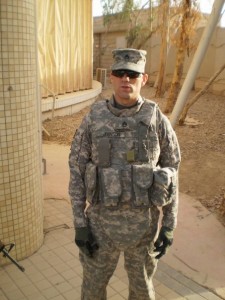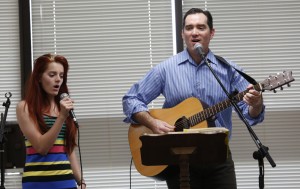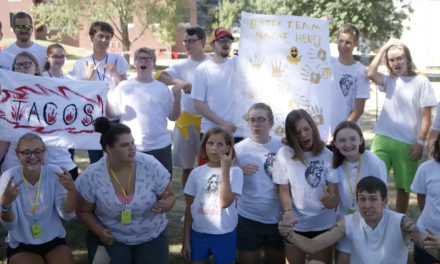By Tobin Perry
YAKIMA, Wash. (BP) — Michael Johnson learned a million little things in the U.S. Army. He learned to make his bed Army-style. He learned to march in the Army band. He learned to shoot an M-16 rifle and throw a grenade.
But maybe the most important lessons he learned during close to a decade as a soldier had nothing to do with combat. He learned how to be a leader and how to look at everyday life as a mission field.
Those lessons continue to serve him well as a church planter in Moxee, Wash., near Yakima.
“The Army — really any military service — it is a huge mission field,” Johnson said. “The values that the Army espouses — loyalty, duty, respect, selfless service, integrity — are completely things that a Christian would affirm, that the Church would affirm. But when you get into the military culture itself, you realize that most of the people are lost.”

Jeff Guillard, left, and Michael Johnson go over the schedule for Sunday worship before the River Church meeting in the Community Room in Moxee City Hall in Moxee, Wash. on Oct. 19, 2014. (KAITLYN BERNAUER)
Johnson, who had been a music major in college, first considered the Army in 2004 after struggling through a couple of unfulfilling customer service jobs and a part-time worship ministry position that was fulfilling but didn’t provide enough pay to support his family. Married with three children at the time, he not only longed to serve his country but also provide his growing young family a little more stability.
“The Army has a pretty strong music program — the Army band,” Johnson said. “When I looked into it, it made a lot of sense. God opened up doors. He used my time in the Army to develop me as a leader and incidentally to help me really understand God’s calling on my life, as far as pastoral ministry.”
After Basic Training and training in the Army’s music program, Johnson’s work revolved around playing for public relations events and entertaining troops. He marks 2006 as the highlight of his Army enlistment. He served for seven months in Iraq, entertaining troops and giving them a little break from their stressful, dangerous work.
“I had a band that I led,” Johnson said. “We played modern rock music and ’90s alternative music. We toured around Baghdad, playing for soldiers. It was a great opportunity. We were proud of what we did. It was the best job in the Army.”
Playing in an Army band wasn’t wihtout danger, though. Because he spent much of his time traveling between bases, he had to be prepared for potential enemy attacks.

Church planter Michael Johnson started The River Church in Moxee, Wash., near Yakima, earlier this year after concluding 10 years in the U.S. Army. Johnson served in the Army’s music program. As part of his duties Johnson spent seven months entertaining troops in Iraq through the Army band.
Photo courtesy Michael Johnson
“There were a couple of times when we were in convoys, traveling from one small base to another,” Johnson said. “We’d get reports that there was an IED on the route or we would stop and inspect a road between us if something looked suspicious. There were a few times like that when you get a little on edge.”
Johnson thought he would retire in the Army. He loved what he did and he loved why he did it. But God had other plans for him.
In 2008, while serving at Ft. Lewis in western Washington state, his pastor asked him to teach a young adult Sunday School class. Johnson had taught previously in church situations, and the opportunity awoke something in him.
“I discovered or re-discovered my passion for teaching the Bible — like never before,” Johnson, a Washington state native, said. “I felt so compelled to study and teach God’s Word that my military ambitions started to pale in comparison.”
At times, Johnson said, he thought about serving as a chaplain or pastoring an established church, but he kept coming back to the realization that God was calling him to start a new church and watch the Gospel take root in a community.
“Almost overnight we got this opportunity to get our feet in the door to go through assessments and find a way to get connected to funding through the North American Mission Board,” Johnson said. “All of that came from an opportunity I was given — really an invitation — ‘Hey, we want you to be a part of this church planting residency.'”
The residency came about through Hillcrest Baptist Church in Enterprise, Ala., near where he finished up his final assignment in the Army. Because he started the residency about five months before his Army enlistment was completed, he didn’t get a chance to finish the entire 10-month program.
But he says the opportunities to lead a mission trip and help start a new worship service at the church, among others, helped him significantly in his preparation to plant.
In January of 2014, the family moved to Moxee, a small, unincorporated community outside of Yakima. Yakima sits in the middle of a large desert in South Central Washington with the Yakima River running through it.

Michael Johnson and his oldest daughter, Olivia, 15, lead the group in singing, “Burning in my Soul” at the beginning of the River Church meeting in the Community Room in Moxee City Hall in Moxee, Wash. on Oct. 19, 2014. (KAITLYN BERNAUER)
“As we really started to pray about coming here we were burdened by a city that has a lot of spiritual darkness, a lot of gang problems, a lot of struggling, desperate churches that need new life and need revitalization,” said Johnson, who has been supported by the NAMB and the Northwest Baptist Convention. “We grabbed a hold of that image of the river giving life to everything around it. That gave us the name to our church — The River Church.”
Though the church has yet to officially launch, the church’s core group has been meeting together at a local community center on Sundays. They’ve reached out together through a community block party.
And, before they’ve had an official worship service, they’ve already started contributing to the Cooperative Program.
“I wouldn’t be a part of the Southern Baptist Convention if I didn’t believe in what we’re doing through the Cooperative Program, what we can do as individual local autonomous churches cooperating together for the sake of the Gospel and the Great Commission,” Johnson said. “We’re excited to — from the very get-go — have a healthy pattern of giving to the Cooperative Program, giving to missions.”
The North American Mission Board has resources and ideas to help churches celebrate Veteran’s Day at www.namb.net/Honoring-Military-Service_Members-and-Chaplains.
Tobin Perry writes for the North American Mission Board.







